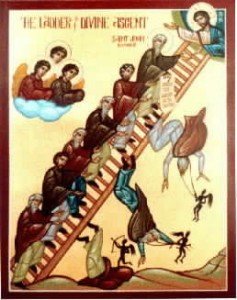 In the last issue I began sharing thoughts on the 29th Step on John’s Ladder of spiritual growth. That step is DISPASSION.
In the last issue I began sharing thoughts on the 29th Step on John’s Ladder of spiritual growth. That step is DISPASSION.
Dispassion could perhaps be considered synonymous with another important word in Eastern theology and spirituality: deification or Theosis, which means to attain the likeness of God, or, as countless Church Fathers have put it, “to become god by grace,” that we “may be partakers of the divine nature” (2 Peter 1:4).
Advanced spirituality can be complicated. One cannot delve into advanced spirituality without getting deep into advanced theology, and the subject of dispassion and theosis is a case in point. Theosis is so important to Eastern spirituality and theology. We must examine what it means to “become god by grace.”
The Eastern Church’s doctrine of theosis is rooted in the Scriptures: “I said, ‘You are gods, and all of you are children of the Most High” (Psalm 81:6). But what does it mean for human beings to be gods? There is only one God, and He is God because He is eternal and uncreated. All other things were created by God from nothing, which means that everything created is wholly contingent. So what does it mean for us who are “but dust and ashes” (Genesis 18:27) to “become” God?
It certainly does not mean that we evolve into the Deity – we cannot be what God is by nature (above being, eternal, all-knowing, all-powerful, all-holy and all-loving) – nor does it involved absorption into the Divine Being and a loss of our own, unique personhood. Rather, it means to acquire the “likeness of God,” which man was given the potential of achieving (Genesis 1:26) through synergy (the cooperation of the human will with divine grace.
Hopefully my readers are getting a clearer idea of what Theosis is since I deal with it several times.
